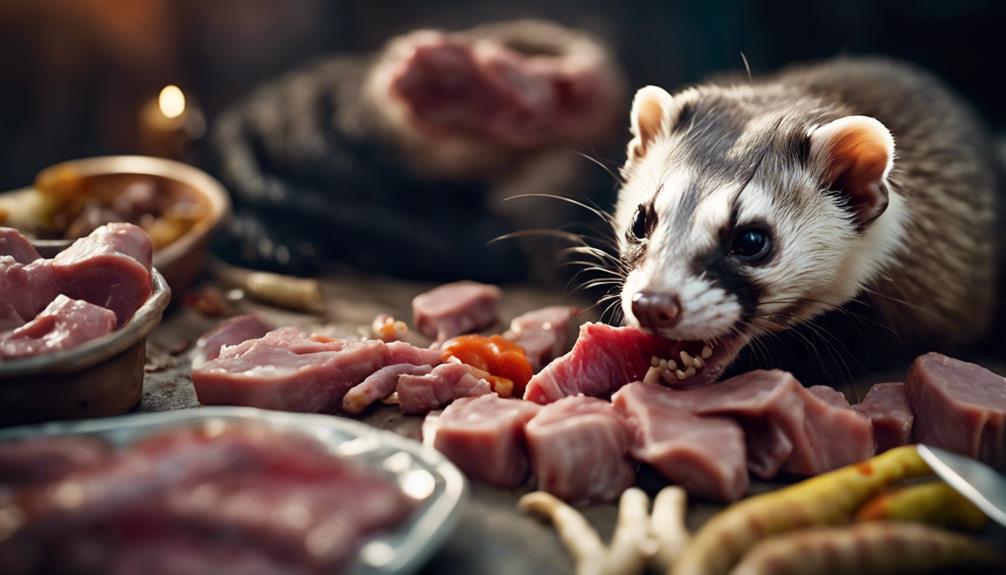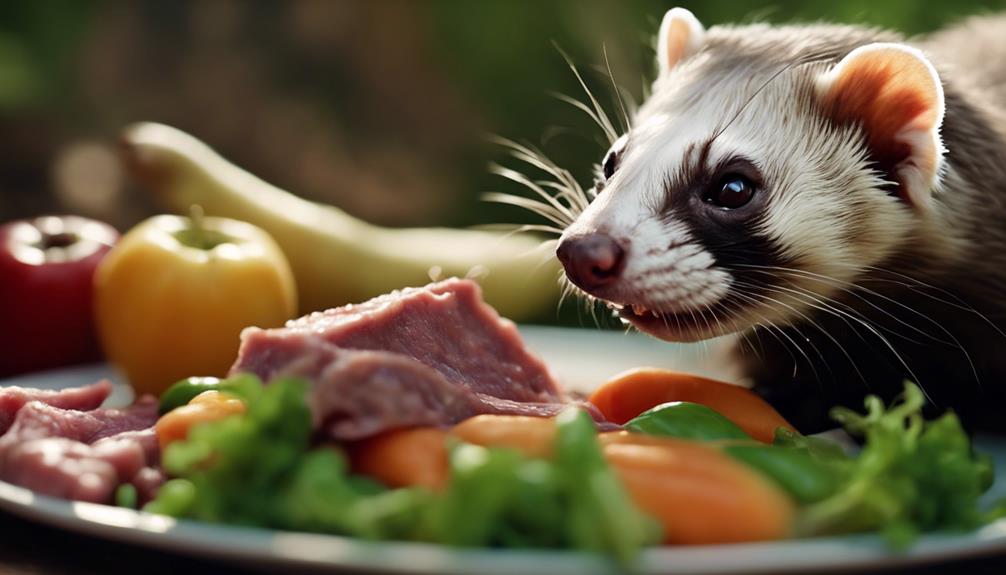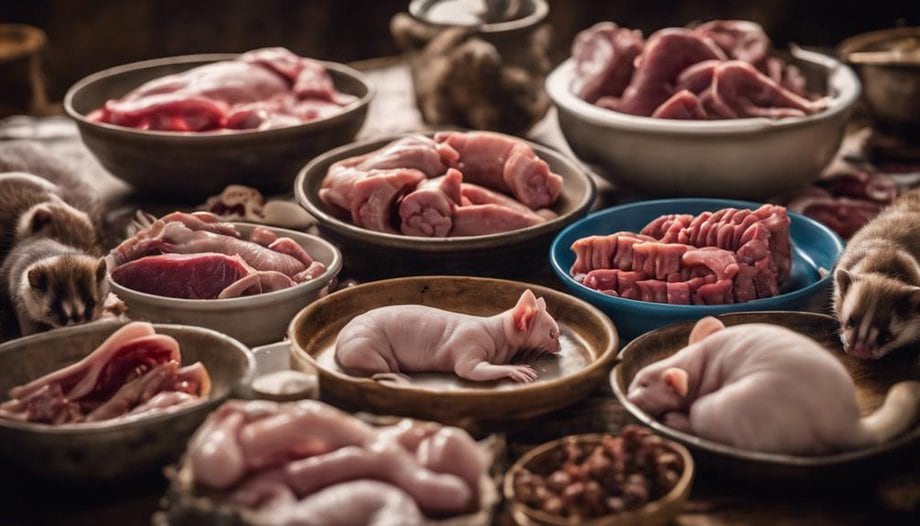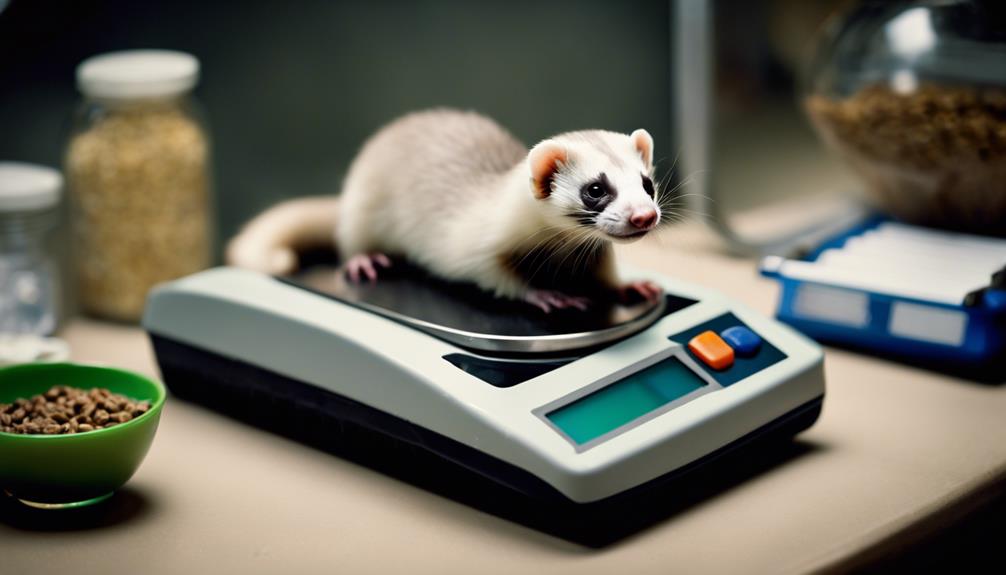Do Ferrets Benefit From a Raw Diet?

Are Raw Diets Beneficial for Ferrets?
The debate continues among ferret owners, with some reporting improved coat quality and energy levels.
Understanding ferrets' unique nutritional needs is key when considering a raw diet.
Explore the pros and cons to make an informed decision for your furry friend.
Potential Benefits of Raw Diet for Ferrets
Feeding ferrets a raw diet can offer numerous advantages in terms of their overall health and well-being. When considering digestive benefits, a raw diet can mimic a ferret's natural diet in the wild, which primarily consists of meat. This can potentially lead to better digestion and nutrient absorption due to the high protein content and absence of fillers or artificial additives that may be present in processed foods.
Moreover, coat health is another significant advantage of a raw diet for ferrets. A diet rich in high-quality proteins, essential fatty acids, and vitamins can contribute to a shiny, soft coat. Ferrets on a raw diet may experience reduced shedding and fewer issues with dry, flaky skin, making their coats more lustrous and healthy.
Risks Associated With Raw Feeding

Raw feeding for ferrets carries potential risks that need to be carefully considered by pet owners. When it comes to food safety, raw diets for ferrets may pose a higher risk of bacterial contamination compared to commercially processed foods. Raw meat, if not handled and stored properly, can harbor harmful pathogens such as Salmonella and E. coli, which can lead to serious health issues for ferrets. Additionally, feeding raw bones can increase the risk of choking, intestinal obstructions, or dental fractures.
Another concern with raw feeding is digestive issues. Ferrets have sensitive digestive systems, and sudden changes or imbalances in their diet can result in gastrointestinal upset, including diarrhea, vomiting, or pancreatitis. Moreover, raw diets may lack essential nutrients like taurine, which is crucial for a ferret's overall health. Ensuring a balanced raw diet that meets all nutritional requirements is essential to prevent deficiencies and health problems in ferrets.
Pet owners considering a raw diet for their ferrets should consult with a veterinarian to address these risks and ensure the diet is appropriate for their pet's individual needs.
Nutritional Requirements for Ferrets

Ferrets have specific nutritional needs that must be met to maintain their health and well-being. Understanding these requirements is crucial when considering a raw diet for ferrets.
Proper nutrition plays a vital role in ensuring ferrets receive the essential nutrients they need to thrive.
Ferret Dietary Needs
A balanced diet rich in high-quality protein, fats, and specific nutrients is essential to meet the nutritional requirements of ferrets. These obligate carnivores have high protein needs, with meat-based sources being crucial for their health. Fats, especially animal fats, provide energy and support skin and coat health. Ferrets also require taurine, an amino acid found in meat, to prevent heart and eye issues. Here is a breakdown of the key nutritional needs for ferrets:
| Nutrient | Importance |
|---|---|
| Protein | Essential for muscle growth and maintenance |
| Fat | Energy source and skin health |
| Taurine | Prevents heart and eye problems |
Raw Diet Considerations
Considering the unique nutritional requirements of ferrets, a diet that incorporates raw meat can be beneficial for their overall health and well-being. Ferrets have a short digestive system designed for processing a diet high in animal protein and fat. Raw meat aligns with their natural dietary preferences as obligate carnivores.
However, ensuring food safety is paramount when feeding raw diets to ferrets. Raw meat should be fresh, of high quality, and handled properly to minimize the risk of bacterial contamination. Additionally, balancing the diet to meet all essential nutrient requirements is crucial. Consulting a veterinarian or animal nutritionist can help ensure that the raw diet provides all necessary vitamins, minerals, and nutrients essential for the ferret's well-being and longevity.
Transitioning Your Ferret to Raw Diet

When transitioning a ferret to a raw diet, gradual introduction of new food is essential to prevent digestive upset and ensure a smooth transition to this nutritionally beneficial diet. Meal planning plays a crucial role in this process. Start by researching appropriate raw food options for ferrets, including meats like chicken, turkey, and rabbit. Ensure a variety of meats are included to provide essential nutrients.
Next, consider food sourcing. Look for high-quality meats that are fresh and free from additives or preservatives. Local butchers or specialty pet stores can be good options for sourcing raw meat.
To transition your ferret successfully, begin by mixing a small amount of raw meat with their current food. Gradually increase the proportion of raw meat over several days or weeks, depending on your ferret's response. Monitor their stools and overall well-being during this transition period. If any digestive issues arise, slow down the transition process. Patience and consistency are key to helping your ferret adjust to their new raw diet.
Feeding Guidelines and Best Practices

Ferrets have specific nutritional requirements that need to be met for optimal health. Understanding how to transition them to a raw diet is crucial in ensuring they receive the necessary nutrients.
Following feeding guidelines and best practices will help ferret owners provide a balanced and healthy diet for their pets.
Nutritional Requirements for Ferrets
To ensure optimal health and well-being for ferrets, it's essential to understand and adhere to their specific nutritional requirements. Ferrets have unique dietary needs that should be met to support their overall health. Here are some key nutritional requirements for ferrets:
- Protein Sources: Ferrets are obligate carnivores, meaning they require high-quality animal-based proteins in their diet to thrive.
- Digestive Enzymes: Ferrets have a short gastrointestinal tract, emphasizing the need for easily digestible proteins and fats.
- Essential Fatty Acids and Vitamin Supplementation: Including essential fatty acids like omega-3 and omega-6, as well as providing necessary vitamins, is crucial for maintaining a balanced diet for ferrets.
Transitioning to Raw Diet
Transitioning ferrets to a raw diet involves gradually introducing high-quality animal-based proteins to their meals to meet their unique nutritional requirements. This transition process should be done slowly to prevent gastrointestinal upsets. It is essential to monitor the ferret's response and adjust the diet accordingly. Additionally, incorporating dietary supplements may be necessary to ensure they receive all the essential nutrients. Below is a table summarizing the key steps to consider when transitioning ferrets to a raw diet:
| Transitioning to Raw Diet |
|---|
| 1. Start Slowly |
| 2. Monitor Response |
| 3. Adjust Diet |
| 4. Consider Supplements |
| 5. Consult a Vet |
Monitoring Your Ferret's Health

Regularly monitoring your ferret's health is crucial to ensuring their well-being and catching any potential issues early on. Here are some key aspects to consider for maintaining your ferret's health:
- Regular Checkups: Schedule routine visits to a veterinarian experienced in ferret care. These checkups can help detect any health concerns early and ensure your ferret is in good condition.
- Observation: Keep an eye on your ferret's behavior, eating habits, energy levels, and litter box use. Any changes in these could be a sign of an underlying health issue.
- Dietary Supplements: Consult with your vet about the necessity of dietary supplements for your ferret. Some ferrets may require additional nutrients that aren't adequately provided through their diet alone.
Conclusion and Final Thoughts

Maintaining a vigilant approach to your ferret's health is paramount for their overall well-being and longevity. When considering the benefits of a raw diet for ferrets, it's essential to focus on their health benefits, particularly concerning digestive health. A raw diet can provide ferrets with a more natural and species-appropriate nutrition, potentially improving their digestive function and overall well-being.
Frequently Asked Questions
Can Ferrets Be Picky Eaters When It Comes to a Raw Diet?
Ferrets can indeed be picky eaters when it comes to a raw diet. Some may experience digestive issues or have specific food preferences. It's essential to provide proper transitioning tips and varied protein sources to ensure their nutritional needs are met.
Are There Any Specific Supplements That Are Recommended for Ferrets on a Raw Diet?
Supplement recommendations for ferrets on a raw diet include taurine, fatty acids, and a balanced vitamin mix. Transitioning tips suggest gradually introducing new foods and monitoring their health. Consulting a veterinarian is crucial for tailored advice.
How Often Should a Ferret Be Fed on a Raw Diet?
For optimal digestive health and weight management, a ferret on a raw diet should be fed multiple small meals throughout the day. This feeding schedule helps maintain nutrient balance and supports their metabolism effectively.
Are There Any Common Misconceptions About Feeding Ferrets a Raw Diet?
Common misconceptions about feeding ferrets a raw diet include concerns about ingredient sources and nutritional balance. Health risks related to the digestive system are often overstated. Properly balanced raw diets can benefit ferrets.
Can a Raw Diet Help With Specific Health Issues in Ferrets, Such as Dental Problems or Obesity?
Weight management, dental health, digestive issues, and coat condition can improve with a raw diet for ferrets. A well-balanced raw diet can address specific health concerns, providing essential nutrients for overall well-being.











